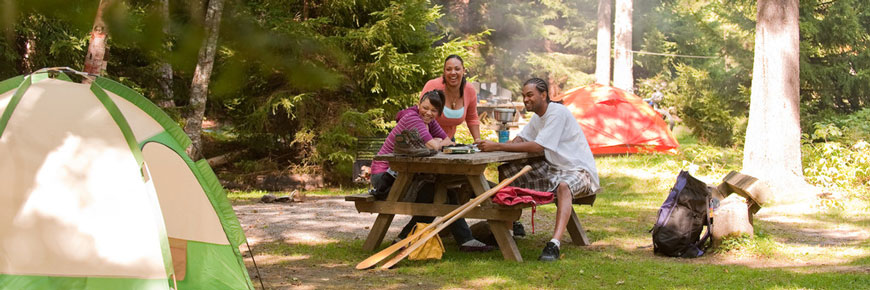
Parks Canada campgrounds
Some of this content is also available in the following languages:
Camping is one of the best ways to enjoy your national parks. With different types of campgrounds offering various levels of amenities and services, you are sure to find a campsite that suits your needs.
Frontcountry Camping
Parks Canada's frontcountry campgrounds are equipped to make your camping stay as comfortable as possible. Many offer flush toilets, showers, potable water, among other facilities, activities and amenities.
Also known as "car camping", is probably the most popular type of camping. Frontcountry campgrounds allow you to drive your vehicle right to the site. You then have the luxury of unloading your vehicle at the exact spot where you are setting up camp. Such campgrounds are often busier than others as they offer the most facilities and amenities including showers, flush toilets, theatres, playgrounds, snack bars, interpretive programming, golf courses and much more – a couple of our campgrounds even have swimming pools! You can choose among different types of frontcountry campsites:
- Serviced campsites
- Serviced campsites offer different combinations of electrical, sewer and water hook-ups for recreational vehicles (RVs), trailers, tent trailers, etc. Combinations of these services exist at different prices. Usually, a campsite offering more services will charge more per night than one with less services. Since these campsites are used frequently by RVs, they may not offer ideal areas for tents. Check with the park before making your reservation if you are planning on tenting.
- Unserviced campsites
- Great for tent camping as many of them offer tent pads and amenities nearby such as flush toilets, showers and potable water. They are usually open to RVs and tent trailers that do not require hook-ups since "unserviced" campsites do not offer electrical, sewer and water hook-ups directly at the site.
- Pull-through campsites
- Also known as drive-through campsites, are designed for visitors towing larger trailers or RVs. They have an entrance and an exit which allows you to pull through the site rather than turning back to exit.
- Walk-in campsites
- Accessible on foot only - you cannot drive your vehicle directly to the site. There is usually a parking area close by where you may unpack and leave your vehicle for the duration of your stay. These sites are usually slightly more rustic with fewer amenities.
- Group campsites
- Designed to accommodate larger sized groups and are usually reserved for organized groups visiting the park together. For more information on group campgrounds, please contact the park directly.
Backcountry Camping
Backcountry Camping is practiced in the wilderness away from facilities and amenities. Most of the time, you will have to hike, ski, snowshoe, canoe or kayak in order to reach backcountry sites. They often have very little in the way of amenities but are often much less crowded and can really make it feel like you’ve gotten away from it all. Backcountry sites are sometimes referred to as primitive sites.
Parks Canada Staff Tips
After setting up camp go to the visitor centre. Staff there will let you know what activities you can take part in during your stay. Many visitor centres also have interesting exhibits to help you find out more about what you can do and see in the national park you are visiting.
Related links
- Date modified :